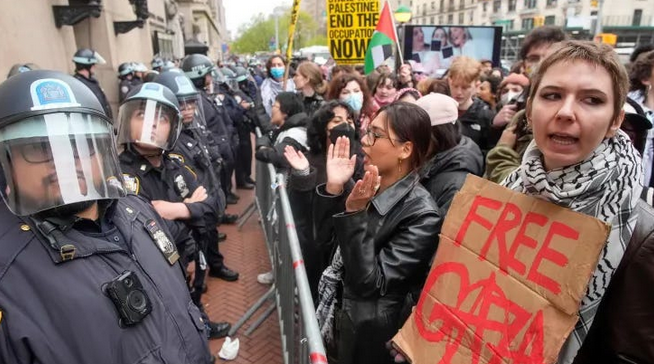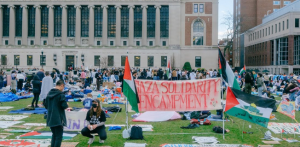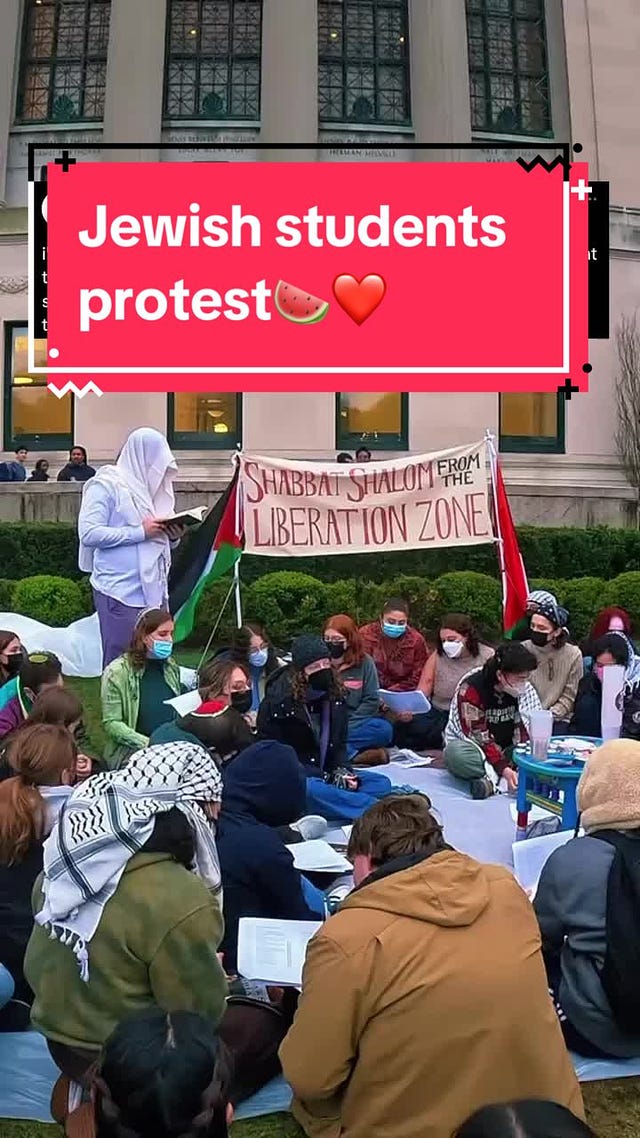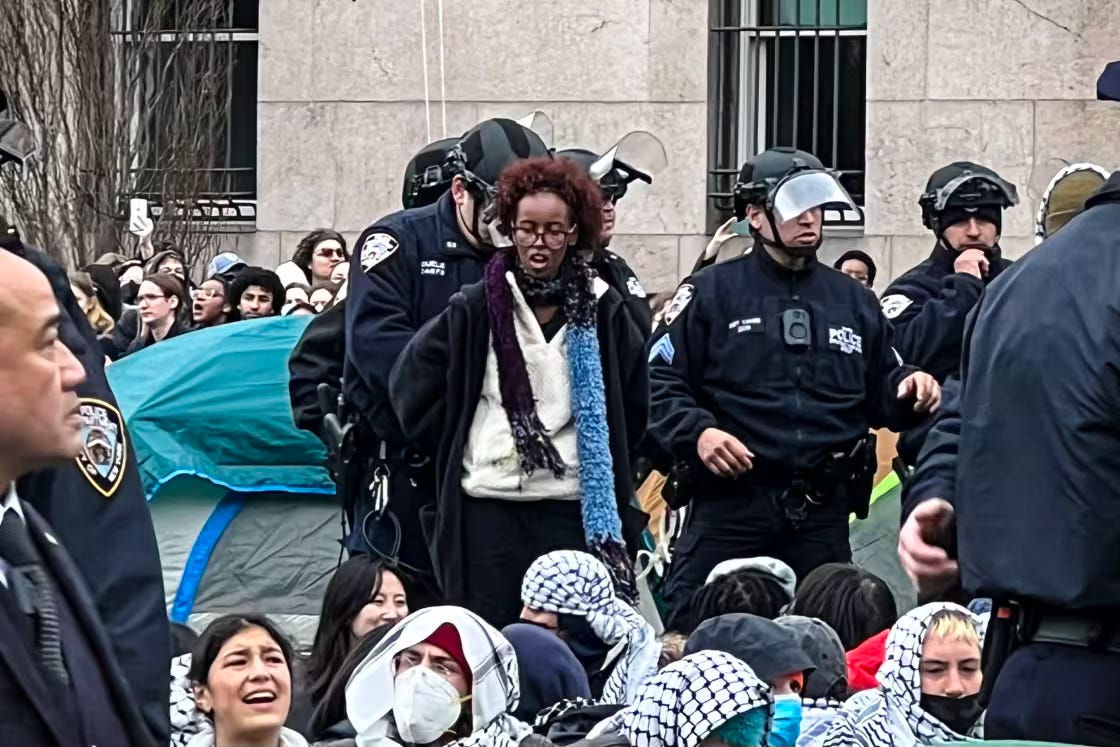Photos: Fredrick Joseph\YouTube Screenshots
As I write this, a reckoning unfolds across the campuses of this nation. Beneath the shade of storied halls and against the backdrop of ivy-wreathed facades, a new generation rises, stirred not by the quiet hum of apathy, but by the thunderous call of justice. College students at Columbia University, Yale, USC, NYU, and many other institutions around the country, are rising in protest against what they have come to understand as an active genocide in Gaza. An ungodly catastrophe led by Israel and funded by the United States that has already claimed the lives of nearly 35,000 reported souls.
Not including the lives taken of aid workers who were simply attempting to provide help on the ground for Palestinians who countless organizations and historically trusted sources, such as the United Nations, have identified are facing high-risk of famine.
Last weekend, I immersed myself in the unfolding narrative at the heart of these protests, spending time at Columbia University in quiet observation, engaged conversation, and earnest listening among the students. As I navigated through the calm of their clustered gatherings, the peaceful yet potent nature of their assembly struck me profoundly. It was not merely the calm of their demeanor but the moral arc of their purpose that impressed itself upon me.
Their plea was articulated with a clarity and wisdom many who are well beyond their years could learn from: they demanded divestment. The institutions to which they entrusted their futures—and their considerable tuitions—were asked to sever financial ties with Israel. This was not a radical overthrow they sought but a reasoned realignment, a plea to ensure that their contributions did not underwrite the destruction of the Palestinian people.
Their voices carried ethical understanding, refusing to unlink the power of their tuition dollars from the geopolitical chains they might inadvertently strengthen. In every conversation, in every chant, their message was straightforward yet seismic: complicity through financial support is a betrayal of the values we should strive to embody and uphold within these academic halls.
Many of the students I encountered were themselves Jewish, wrestling profoundly with the duality of their identity and their convictions. They articulated, with an unflinching resolve, a distinction that the broader discourse often neglects to recognize—the actions of a right-wing-led Israeli government do not echo the diverse voices of all Jewish people. They stood firmly, draped not just in the identity handed to them by birth, but in the more arduous cloak of moral choice.
In this moment, young voices, bold and unyielding, pierce the veil of routine discourse. They stand at the very frontier of moral struggle, embodying the fierce urgency of now. They gather not for minor grievances, not for transient woes, but to challenge an unfolding tragedy that lives at the very essence of our collective humanity.
One might assume, quite reasonably, that any person of even moderate decency would look upon these young souls—students who have abandoned the comfort of their lecture halls and dormitories—to stand in solidarity with the millions of innocent Palestinians ensnared in a calculated and cruel purge, and feel a surge of pride. Yet, regrettably, this is not the situation we find ourselves in.
In this charged moment, where the sound of justice should ring through the corridors of power and the cloisters of our academic beacons, we find a disheartening silence, punctuated by acts of suppression. The very institutions that should be the bastions of critical thought and defenders of ethical engagement—the colleges and universities themselves—have turned their backs on these courageous students. Instead of heralding their bravery, the administrations have levied punishments: suspensions handed down to students with a bureaucratic coldness that chills, weaponizing the potential loss of scholarships, and threats from powerbrokers claiming they will gladly become an obstacle in the path of students’ futures if protests continue.
University of Southern California is a perfect example of how institutions have worked to stifle these students. Graduating senior, Asna Tabassum, was Valedictorian of her class but had her commencement speech canceled by the school because of her pro-Palestinian stance. This same school offers a Resistance to Genocide Interdisciplinary minor, yet punishes its students for resisting genocide. the hypocrisy is staggering. But such is the case when “liberation” is seen as jargon to appease for optics.
Even worse, these institutions, these alleged havens of learning and liberty, have summoned the thuggery of police forces. The result? The arrest of hundreds of students across the nation. Shackled and hauled away, their cries for justice choked by the cold hands of settler colonial investment. In scenes all too familiar and yet freshly appalling, students, armed with nothing but their voices and their signs, have been met with the stark reality of police batons, tear gas, and handcuffs. It is a glaring juxtaposition—the ideals of academic freedom and the brutal reality of police enforcement—showing us that the path to justice is not only filled with obstacles but guarded by those who would rather silence dissent than address the grievances at its root.
All of this transpires under the guidance of university administrations who are well aware that many of these students are people of color, whose daily realities are already punctuated by the looming threat of violence and discrimination at the hands of such forces.
These authoritarian responses from various institutions aiming to suppress and dismantle protests have made it unmistakably clear that this moment must be but the first stone pulled from the corroded pillars upholding this nation. These pillars, weathered not by time but by the relentless erosion of complacency, complicity, white supremacy, capitalism, and imperialism, sustain structures of power that are fundamentally misaligned with all ideals of liberation and equity.
Such wonderfully profound student activism serves as more than just a reaction to the horrors unfolding in Gaza; it marks a critical point in a broader reckoning with the very foundations of justice and democracy in our nation. These students, armed with nothing but their conviction and voices, have drawn a line that forces a necessary interrogation of the institutions that shape our society.
We must understand, then, that what we witness is not merely a series of protests but a signal, a call to dismantle the entrenched systems that perpetuate injustice. It becomes evident that pulling at this thread—the financial ties to destructive forces—must be the beginning of unraveling the broader yarn of complicity that upholds our societal structures. This is not merely about divestment from the right-wing Israeli government as a geopolitical entity; it is about divesting from antiquated and harmful ideologies that have long been woven into the American ethos.
In this American colonial experiment, we find ourselves at a crossroads, one traced and retraced by the tireless movements of youth who dare to demand more. We speak often of liberty, but less of what it demands. Liberty requires not merely the presence of empathy, nor the absence of cruelty, but the active and unyielding resistance to horrors such as genocide—resistance to the systematic destruction of a people not only through bombs and blockades but also through the insidious weapons of silence and complicity.
For these students, and for people around the world, to confront and expose Israel’s actions in Gaza is to also pull back the broader blood-soaked veil of colonial settler nations globally. In recognizing the brutalities inflicted upon Gaza, we also recognize that this is not confined to one region but quakes through the histories and contemporary realities of colonial powers such as the United States, Australia, and South Africa.
To witness the current generation, these students marching, chanting, and sitting-in, all for the sake of resisting the machinery of death and oppression, is to witness our nation contending with its own soul. These young people are told repeatedly that America is not yet ready for their truth, that change must wait. But a nation that demands patience of its people, a nation that reprimands them for not standing by idly during a genocide that it is funding, is a nation teetering on the brink of oblivion.
And deservedly so.
A nation that will not allow its people to stand up for the humanity of others, is a nation that should no longer exist as it currently does.
Frederick Joseph is a two-time New York Times bestselling author of The Black Friend (2020) and Patriarchy Blues (2022), Better Than We Found It (2022) and Black Panther: Wakanda Forever – The Courage to Dream (2022). He was recognized for the International Literacy Association’s 2021 Children’s & Young Adults’ Book Award, is a 2019 Forbes 30 Under 30 list-maker for marketing and advertising, an activist, philanthropist, and poet.
Frederick was also honored with the 2023 Malcolm X and Dr. Betty Shabazz Vanguard Award, the 2018 Comic-Con Humanitarian of the Year award and is a member of the 2018 “The Root 100″ list of Most Influential African Americans.
His forthcoming literary works are his debut poetry collection, We Alive, Beloved, his debut novel, This Thing of Ours, and the non-fiction essay collection, Color Me Grateful.
















